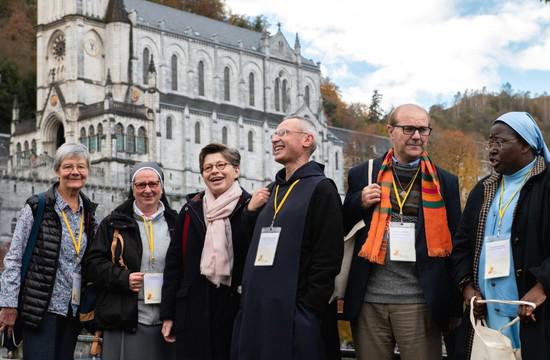|
Women and men religious in France discuss 'change' in the Church
By Bruno Bouvet
Religious appear to agree on the importance of a balanced community life to prevent abuse, including the correct use of speech and authority Women and men religious with CORREF president, Véronique Margron, at Lourdes on Nov. 10. (Photo by Lourdes Shrine/F. Lacaze/Ciric) French religious communities, whose leaders are meeting in Lourdes until Nov.13, have not been immune from the problems and abuses highlighted by Pope Francis in his Letter to the People of God. Many now view these difficulties as an opportunity for renewal, particularly in Church governance. What did Father Jean-Pierre Longeat, a monk from Ligugé and former president of the Conference of Men and Women Religious in France (CORREF), mean when he spoke of “beneficial situations that are forcing us to take a stand”? In fact, he was referring to the range of abuses that religious, apostolic and monastic communities are now facing, the painful unveiling of which has continued to devastate congregations in recent months. On Nov. 10, Father Longeat met over lunch with several participants at the CORREF General Assembly in Lourdes to consider how to respond to the current Church crisis. But not everyone was pleased with the choice of the word “crisis” to characterize the present situation. “I would prefer to speak of the Church’s suffering when confronted with realities that it has often failed to address,” said Father Laurent Tournier, a Eudist priest, who is rector of the Orleans seminary and a member of the Commission for Preventing and Combating Pedophilia established by the Bishops Conference of France. “We could use the word crisis if we understood it in the sense of a stage, as something short term,” said Father Longeat. “What we are actually experiencing is much deeper than that and also echoes changes in society in general.” Developing the basis of a renewalMany religious interviewed at Lourdes, prefer to speak of a “profound change.” Terms such as “collapse,” “chasm” and “crack” crop up repeatedly in many conversations. The aim is not to open up a ditch in which to bury Catholicism -- particularly religious life, which is facing the inescapable reality of an ageing membership --, but rather to establish the foundations for a renewal. “We are going to be called to live differently and God is waiting for us,” said Sister Mariannick Caniou, superior general of the Sisters of Providence of Pommeraye in west-central France. Nor is she upset at this prospect. Women religious in particular seem to aspire to a “new form of governance” that will be less masculine and less “overbearing” on the part of priests, as Xaverian Sister Joëlle Ferry made clear. “The point at issue is to understand how the Church will develop, how it will fill a vital gap, namely the role of women in governance and decision-making bodies,” the former CORREF vice-president noted. Recalling that “religious life always develops out of a movement that encompasses it,” she said that the French Church has evolved greatly over the last 30 years in terms of personal, psychological and spiritual formation of novices and abuse prevention. These changes are not to be feared but rather “welcomed,” many meeting participants said in informal comments outside the meeting. Personal challengeParticipants expressed considerable sadness over the number of scandalous revelations involving the Church, although some also posed questions about the actual number, warning against getting caught up in media hype. Nevertheless, neither men and women religious are seeking to excuse themselves from personally facing up to the issue. “After learning of several cases that I would never have suspected, I now recognize that I would also have been in denial, like the superiors of various communities and many bishops,” said Father François You, abbot of the Benedictine Abbey of Maylis in southwestern France. He said it was the revelation of abuses in Chile that finally caused him to feel personally concerned by abuses, which he had previously viewed from a distance. “For us as religious, the point of this change is to learn how to enable ourselves to come to grips with our mistakes,” said Father Longeat. “Not everyone is a sexual deviant but everyone has an emotional life that needs to be reflected upon,” he said. In relation to both sex and power issues, all religious appeared to agree on the importance of a balanced community life, including the correct use of speech and authority, which are all essential in the prevention of abuses.
|
.
Any original material on these pages is copyright © BishopAccountability.org 2004. Reproduce freely with attribution.
